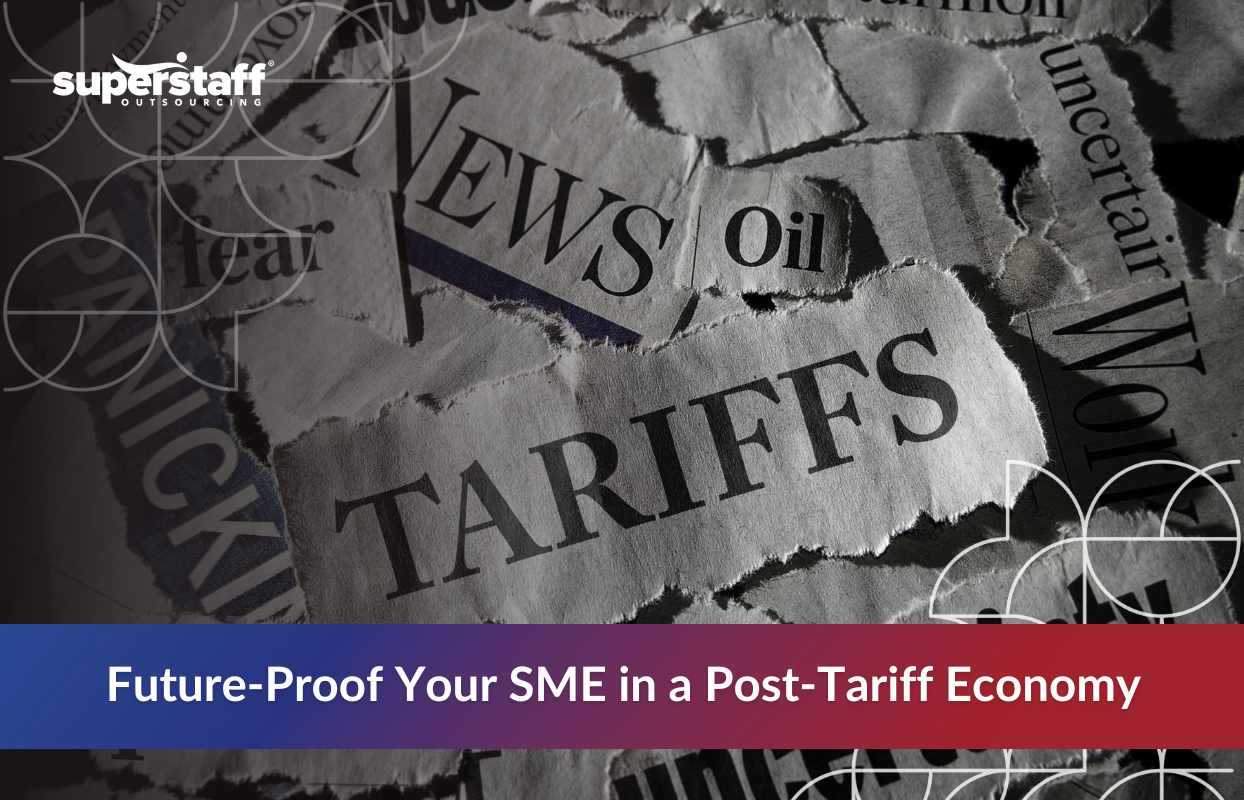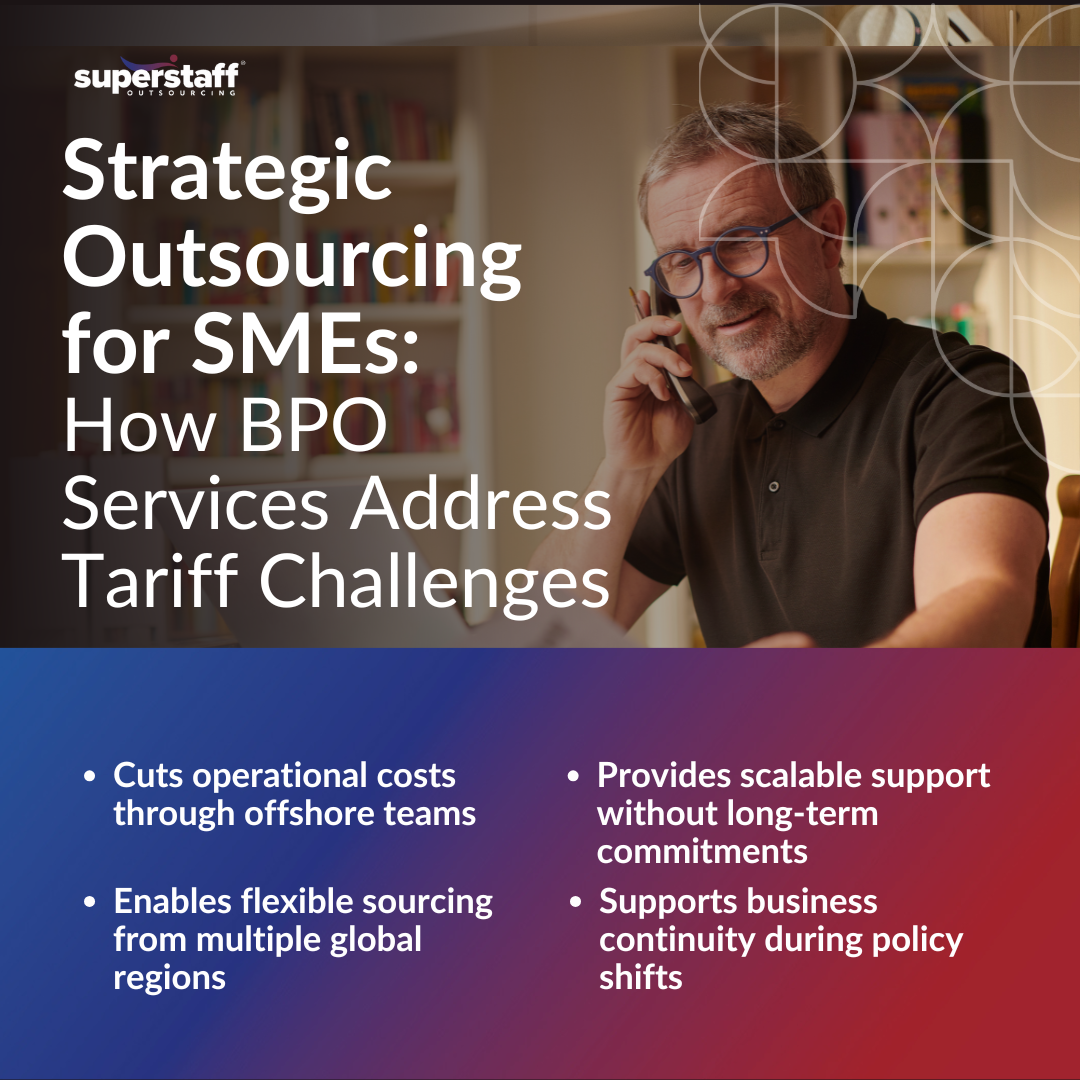
Strategic outsourcing for SMEs is no longer a luxury—it’s becoming a lifeline.
Trump’s Liberation Day tariffs have sent shockwaves through small- and medium-sized enterprises nationwide, but could this disruption lead to smarter, more agile operations?
On March 20, 2025, former President Donald Trump announced sweeping new tariffs under what he’s dubbed “Liberation Day”—a bold move to “reclaim American industry” through stiff penalties on imported goods. While the message plays well politically, the policy’s immediate impact is undeniable: skyrocketing operational costs, disrupted supply chains, and a sharp jolt of uncertainty, especially for SMEs. Unlike large corporations, SMEs lack the financial cushion and global infrastructure to absorb such sudden economic tremors.
But not all is lost. In fact, some SMEs are finding a surprising path forward—by looking outward. Strategic outsourcing for SMEs has emerged as a powerful lever, offering a way to minimize costs, tap into global talent, and stabilize business operations amid policy whiplash. Far from being a stopgap, outsourcing is becoming a core strategy for companies striving to stay competitive in an increasingly volatile economic climate.
This article explores how strategic outsourcing for SMEs can help you overcome the challenges brought by Trump’s Liberation Day tariffs—and how doing so might be the smartest move you make this year.
What SMEs Need To Know About Tariff-Related Disruptions in 2025
Trump’s Liberation Day tariffs significantly alter the economic landscape for SMEs.
On March 20, 2025, former President Trump introduced sweeping new tariffs to revitalize American manufacturing. These “Liberation Day” tariffs targeted key imports across electronics, raw materials, textiles, and machinery. The policy was framed as a patriotic push to restore domestic industrial strength and reduce reliance on foreign goods. However, the unintended consequences have created a challenging business climate for small- and medium-sized enterprises (SMEs).
Rather than triggering widespread industrial resurgence, the tariffs have inflated production costs, caused significant supply chain bottlenecks, and placed SMEs at a competitive disadvantage. Lacking the resources of larger firms, SMEs are now scrambling to adapt to a new set of economic constraints.
- Increased production costs: Import taxes have made raw materials and components sourced from abroad significantly more expensive. SMEs that rely on global suppliers for affordability and quality now face shrinking margins or the need to raise prices.
- Supply chain disruptions: The tariffs have disrupted long-standing supplier relationships and introduced delays due to customs clearances and product shortages. Many SMEs struggle to find alternative domestic sources that meet their quality and quantity requirements.
- Competitive disadvantages: While large corporations can leverage scale and resources to reconfigure their supply chains or absorb additional costs, SMEs are vulnerable. Without the same bargaining power or infrastructure, many are losing customers to better-positioned competitors.
Immediate Impacts on SMEs
SMEs feel immediate financial pressures due to rising costs and disrupted supply chains.
The shockwaves from the Liberation Day tariffs were felt almost overnight. SMEs across industries report significant and immediate increases in their cost of goods sold. For many, this has meant adjusting pricing strategies, re-negotiating contracts, or in some cases, pausing operations entirely.
Examples include boutique furniture businesses struggling to afford imported metal frames and hardware, or small electronics retailers unable to restock key items due to inflated import duties and extended shipping delays.
- Reduced profit margins: The most direct impact has been on profitability. SMEs now operate on thinner margins, making investing in growth initiatives and absorbing additional economic shocks harder.
- Challenges meeting customer demand: Delays in obtaining parts and products have led to missed deadlines and canceled orders. For industries where timing is crucial, like seasonal retail or tech launches, this can be catastrophic.
- Inventory management difficulties: The unpredictability of international shipping and rising costs have made inventory forecasting and planning more difficult. SMEs are forced to either overstock and tie up cash flow or risk running out of stock.
Long-Term Risks for SMEs
Beyond immediate pressures, tariffs pose long-term risks to SMEs’ sustainability and growth.
As the tariffs continue to affect import flows and raw material prices, SMEs face challenges that go beyond operational headaches. These pressures compound over time, undermining long-term planning and innovation.
SMEs that were previously on the path to scaling operations or entering new markets may now be forced to reconsider their strategies.
- Difficulty expanding operations: With higher input costs and cash flow strain, SMEs may delay or cancel plans to grow. Investments in new equipment, facility expansion, or product development are often the first to be cut.
- Loss of customer base to larger competitors: Customers may turn to businesses that can maintain lower prices and a more consistent supply. Over time, SMEs could see significant erosion in market share.
- Inability to pivot strategically: Tariff-related uncertainty limits a business’s ability to experiment, test new markets, or innovate quickly. Many SMEs are stuck in survival mode, unable to think beyond the next quarter.

How Strategic Outsourcing Mitigates Tariff Impacts
Strategic outsourcing serves as a powerful tool for SMEs to address tariff-induced disruptions.
In today’s unpredictable economic climate, strategic outsourcing for SMEs provides a critical buffer against sudden shocks like Liberation Day tariffs. By outsourcing non-core business functions to specialized offshore partners, SMEs can regain control over cost structures and improve operational agility.
This approach helps SMEs remain lean, efficient, and focused on growth, despite external pressures.
- Cost reduction and financial flexibility: Outsourcing labor-intensive or time-consuming functions (e.g., customer service, payroll, IT) to lower-cost markets can significantly reduce expenses. This frees up cash flow for core functions.
- Scalability and agility in operations: SMEs can scale operations up or down depending on demand without the burden of long-term commitments to local infrastructure or personnel.
- Enhanced resilience against market volatility: When tariffs or regulations suddenly shift, outsourced partners often provide alternative workflows or sourcing options that help minimize business interruptions.
Cost Reduction Through Outsourcing
Outsourcing significantly reduces operational costs for SMEs affected by tariffs.
One of the most effective cost-saving strategies for SMEs is tapping into global labor markets through outsourcing. Labor in countries like the Philippines, India, and Colombia often costs a fraction of what SMEs would pay locally, without sacrificing quality.
When applied strategically, these savings can be transformative.
- Savings on labor-intensive tasks: Functions such as data entry, customer service, and technical support can be outsourced to skilled professionals abroad, allowing SMEs to avoid high domestic salary expectations.
- Reduced overhead and administrative costs: Offshore teams operate from their own facilities, reducing the need for SMEs to maintain large offices or invest in equipment and training.
- Improved financial efficiency: Lower fixed costs result in a leaner financial model. This enables businesses to stay profitable even during periods of suppressed revenue.
Enhancing Supply Chain Flexibility
Outsourcing allows SMEs to maintain supply chain stability amid disruptions.
The tariff effects on supply chains have been both deep and wide-ranging. By outsourcing elements of logistics, warehousing, and inventory management, SMEs can build more adaptive and responsive supply chains.
This flexibility helps prevent service gaps and lost revenue.
- Streamlined inventory management: Outsourced fulfillment centers and logistics experts can better manage stock levels and automate replenishment cycles, avoiding costly overstocking or stockouts.
- Better responsiveness to market fluctuations: Outsourcing logistics enables businesses to adapt quickly to changing consumer demand or shipping constraints.
- Diversified sourcing strategies: Some outsourcing providers help SMEs source materials from alternative regions, bypassing tariff-affected countries altogether.
Boosting Competitiveness Through Specialized Talent
SMEs can harness specialized talent globally through outsourcing, enhancing their competitive edge.
Strategic outsourcing enables SMEs to compete at a higher level by granting access to top-tier talent otherwise out of reach.
With global access to experienced customer experience, IT development, analytics, and compliance professionals, SMEs can deliver enterprise-level performance.
- Improved operational efficiency: Specialized teams streamline processes, reduce errors, and deliver consistent results. This improves brand reputation and customer satisfaction.
- Higher quality output at lower costs: Global talent often brings a high skill-to-cost ratio, meaning SMEs get more value for every dollar spent.
- Ability to quickly adapt and innovate: Outsourcing partners offer expertise and insights from multiple industries and markets, making it easier for SMEs to pivot, experiment, or adopt new technologies.
Future-Proofing SMEs with Outsourcing
Strategic outsourcing positions SMEs to navigate future economic uncertainties.
The future of global trade is anything but predictable. As new policies emerge and economic conditions fluctuate, outsourcing helps SMEs stay resilient.
What SMEs need to know about tariff-related disruptions in 2025 is that reacting too late can mean losing out on key opportunities to strengthen their foundations.
- Building operational resilience: Outsourcing minimizes the fallout from policy shifts by decentralizing processes and distributing risk.
- Staying adaptive to shifting trade policies: With a global partner network, SMEs can redirect operations to avoid disruptions.
- Enhancing business continuity: Outsourcing provides built-in redundancies that ensure operations continue, even during supply or labor shortages.
Turning Tariff Turmoil into Growth: The Power of Strategic Outsourcing for SMEs
By understanding the short- and long-term risks of tariffs and how outsourcing can mitigate them, SMEs can regain control in a volatile business environment. From cost savings to supply chain agility and access to specialized talent, the advantages of outsourcing are clear.
At SuperStaff, we specialize in helping SMEs future-proof their operations through tailored outsourcing solutions. Whether it’s customer experience, logistics support, administrative functions, or tech services, our global teams provide the scalability, flexibility, and expertise needed to thrive in uncertain times. We work closely with clients to align our services with their business goals, ensuring maximum impact and long-term value.
Prepare your SME for resilience and growth—partner strategically with SuperStaff and discover how outsourcing can turn today’s disruptions into tomorrow’s advantages.






